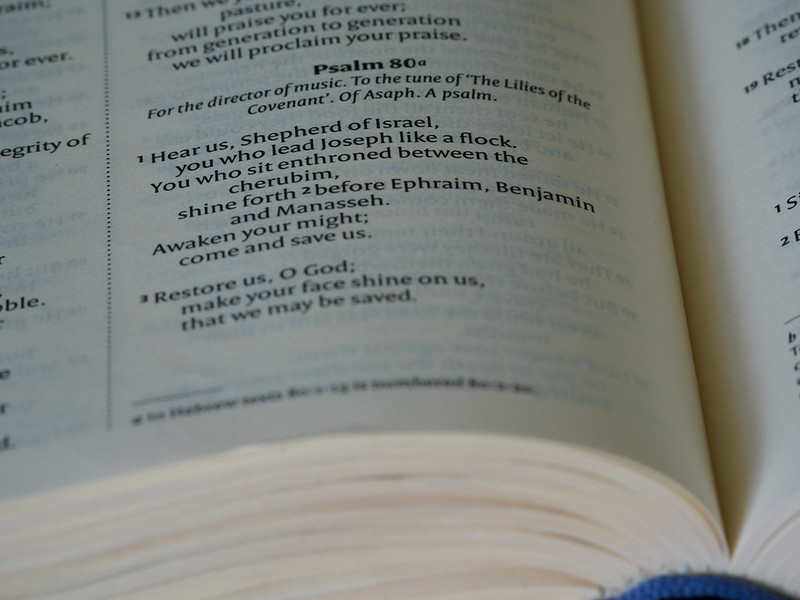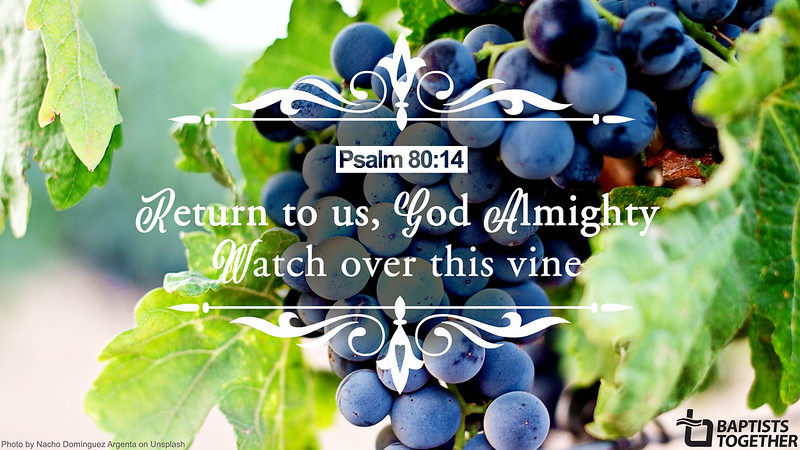 START WITH SCRIPTURE:
START WITH SCRIPTURE:
Psalm 80:1-7, 17-19
CLICK HERE TO READ SCRIPTURE ON BIBLEGATEWAY.COM
OBSERVE:
This Psalm appeals to the Lord for intervention in a time of adversity. It is described as a Psalm of Lament. It is difficult to tell from the context alone if the Psalm was written before or after the exile of Israel. It doesn’t really matter to the reader, because it is clearly a cry for help in any event. One clue, though, might be the mention of the tribes of Ephraim, Benjamin and Manasseh, which would suggest that the Psalm was written before the Northern Kingdom of Israel was destroyed and scattered by the Assyrians in 722 B.C.
The imagery of the Lord as Shepherd is familiar to us, and comforting — but then there is the imagery of the Lord sitting enthroned between the cherubim. The cherubim are those terrifying angelic figures who are depicted as the guardians of Eden with a sword of flame, and the close companions of the Lord who bear him up with wings of the wind. This description of Yahweh is much more intimidating. There may also be a reference to the winged cherubim made of gold who flank the Ark of the Covenant in the Holy of Holies within the temple.
But what does the Psalmist seek? Restoration, revival, salvation. He cries out for the Lord to awaken, and to make his face shine on them again. This hearkens back to the Deuteronomic blessing that Aaron was instructed to give as High Priest:
Yahweh bless you, and keep you.
Yahweh make his face to shine on you,
and be gracious to you.
Yahweh lift up his face toward you,
and give you peace (Numbers 6:24-26).
There may also be a reference to the glory of God that accompanies his presence — the same glory that made the face of Moses shine after he’d been in the presence of the Lord.
But there’s a catch — God is now angry with Israel. The result of his anger is the deep grief of Israel and the derision and mockery by their enemies. Their grief is expressed in a very concrete image — their very food is drenched by tears, and their drinking bowls are full of tears!
We don’t really know the specific cause of this disruption in their relationship with their God, but it could be any one of many of Israel’s historic setbacks.
The refrain recurs as a kind of litany three times:
Revive us, and we will call on your name.
Turn us again, Yahweh God of Armies.
Cause your face to shine, and we will be saved.
And what is the source of that salvation? The Christian reader can’t help but read into the Psalm a messianic prophecy:
Let your hand rest on the man at your right hand, the son of man you have raised up for yourself.
The phrase son of man may have many meanings, but one that is inescapable for the Christian is Messianic. Jesus uses this phrase repeatedly in the Gospels when referring to himself.
APPLY:
At some point we all know how it feels to be defeated, demoralized, in despair — as a nation, a family, an individual. The cry of the Psalmist isn’t far from the experience of any of us.
We have all tasted our own tears of grief or shame; and we probably know what it feels like to be despised by someone because of our mistakes.
What we cry out for, in our nation, our church, our family, our own lives, is revival and restoration. If once we have experienced the presence of God in our lives — if we have known the shine of his face — and it has faded for us, we earnestly yearn for it again.
We will find our revival and restoration in the life and the light of Christ, who brings not only salvation from our sins but healing to our hearts, and the power to live the holy lives to which he calls us.
RESPOND:
I find myself from time to time dealing with my own drift away from God. I have to cry out again for renewal and revival. As with the Psalmist this happens when I begin to call out God’s name and seek to live according to the claims of his name.
Our Lord, our nation experiences victories, but also sees defeats — the disabled veteran who wonders ‘was it worth it?’ The ambiguity of race relations in a divided country. And our own personal struggles with grief or depression. We don’t have the wisdom to provide all the answers. But you have provided a Person who is wisdom incarnate, and salvation, and new life! May we find our source of healing and salvation in Christ! Amen.
PHOTOS:
“Psalm 80” by Brett Jordan is licensed under a Creative Commons Attribution 2.0 Generic license.



![A Mighty Fortress Is Our God! [photo by Holly Hayes]](https://soarlectionarybiblestudy.wordpress.com/wp-content/uploads/2016/01/2330234288_59cc82ec93_z.jpg)